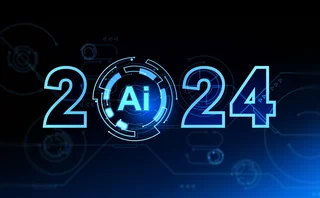Moving Forward, Looking Backward
John introduces himself as the new deputy editor for Buy-Side Technology and considers how in times of upheaval, we look for the comforts of the past.

As some of you will have seen from Anthony Malakian's final Buy-Side Technology editor's letter last week, this will be my patch of the Waters website going forward, and perhaps I should give you a short brief on myself.
In the year-and-a-half that I've been writing for Waters I have covered everything from Target2-Securities to transaction cost analysis, from fixed-income to foreign exchange, from dark pools to Brexit, and so on. I've also hosted a few of our Asia-Pacific conferences in Singapore
Without really aiming to, I gravitated toward the sell side of institutional investments, perhaps a natural slant given that I came to Waters without any prior experience reporting on the capital markets.
As Anthony detailed in last week's letter, before Waters I wrote for a few publications dealing in both consumer and corporate finance in the UK.
While it was interesting to see how the bankruptcy and insolvency process actually worked, it was also a cut-throat business and one that I don't have any desire to return to. Ditto for consumer credit.
It seems quite fitting then that during a period of remarkable upheaval, particularly in Europe, I should take over BST duties.
Brace for Change
In times of trouble people will often seek to escape the harsh realities around them and so far, 2016 has been one of the most eventful, chaotic and generally confusing years that I've ever witnessed, and there are still five months of it left.
It comes as little surprise then that so many people around the world seem to be fleeing from the disorienting events taking place and finding refuge in the comforting glow of nostalgia.
Between the release of a Ghostbusters movie, a female Conservative UK Prime Minister, and hordes of people roaming the streets in search of monsters following the launch of Pokémon Go, it feels like we've somehow taken a trip in time to the early 1990's, when things were radical and heroes came in half-shells.
As Mary Shelley wrote in Frankenstein: "Nothing is so painful to the human mind as a great and sudden change."
Far be it from me to argue with such an illustrious literary figure, but while change can be a frightening thing, it's also the base reason for our continued evolution.
Think of all the technological change that has occurred within the financial services industry in the past decade alone: Iconic trading pits have disappeared, replaced by desks covered in screens; cloud services have become the bedrock upon which so many tech stacks function; mobile devices mean traders and asset managers are no longer slaves to their desks.
In short, change is innovation, change is forward momentum.
The buy side is often slower than the sell side on the uptake of new tech. As banks ruthlessly hunt down anything with a whiff of disruption about it, asset managers usually take a more cautious route, fully exploring their options before making the investment.
But asset managers aren't ignorant of the power of transformational change. When I interviewed Aberdeen's Iain Plunkett for the April cover feature, the theme of technology as the primary driver for change was the core of our conversation, and it is a recurring theme I hear from many other buy side participants, particualarly at our various conferences.
In other words, according to Nietzsche: "The snake which cannot cast its skin has to die. As well the minds which are prevented from changing their opinions; they cease to be mind."
Side Notes
• While the rest of the world is going mad over Pokémon Go (some of our very own journalists included—you know who you are), I have largely let the whole thing pass me by. Maybe it's because I grew up in the 90s and had a copy of the original on my beloved grey brick GameBoy, but I just can't get excited about wandering around London staring at my phone while searching for invisible monsters.
• As an avid football/soccer fan, I'll be your window into the upcoming English season and keeping you abreast of all the news relating to the country's *greatest* team, Reading FC. (Quit laughing—if Leicester can do it, anyone can.)
• Tonight sees the return of the annual Waters Rankings Awards, as voted for by you, our dear readers. While I won't be attending the ceremony itself I am heavily involved in putting together our website and magazine coverage, so if you're attending, have a drink for me while you're there.
• Speaking of events, it's a few months before our next London-based conference—the European Trading Architecture Summit in November—so if you can't wait that long to speak to me, drop me an email at john.brazier@incisivemedia.com.
Only users who have a paid subscription or are part of a corporate subscription are able to print or copy content.
To access these options, along with all other subscription benefits, please contact info@waterstechnology.com or view our subscription options here: http://subscriptions.waterstechnology.com/subscribe
You are currently unable to print this content. Please contact info@waterstechnology.com to find out more.
You are currently unable to copy this content. Please contact info@waterstechnology.com to find out more.
Copyright Infopro Digital Limited. All rights reserved.
As outlined in our terms and conditions, https://www.infopro-digital.com/terms-and-conditions/subscriptions/ (point 2.4), printing is limited to a single copy.
If you would like to purchase additional rights please email info@waterstechnology.com
Copyright Infopro Digital Limited. All rights reserved.
You may share this content using our article tools. As outlined in our terms and conditions, https://www.infopro-digital.com/terms-and-conditions/subscriptions/ (clause 2.4), an Authorised User may only make one copy of the materials for their own personal use. You must also comply with the restrictions in clause 2.5.
If you would like to purchase additional rights please email info@waterstechnology.com
More on Emerging Technologies
Waters Wavelength Ep. 300: Reflecting on humble beginnings
It is our 300th episode! Tony and Shen reflect on how it all started.
An inside look: How AI powered innovation in the capital markets in 2024
From generative AI and machine learning to more classical forms of AI, banks, asset managers, exchanges, and vendors looked to large language models, co-pilots, and other tools to drive analytics.
Asset manager Saratoga uses AI to accelerate Ridgeline rollout
The tech provider’s AI assistant helps clients summarize research, client interactions, report generation, as well as interact with the Ridgeline platform.
LSEG rolls out AI-driven collaboration tool, preps Excel tie-in
Nej D’Jelal tells WatersTechnology that the rollout took longer than expected, but more is to come in 2025.
The Waters Cooler: ’Tis the Season!
Everyone is burned out and tired and wants to just chillax in the warm watching some Securities and Exchange Commission videos on YouTube. No? Just me?
It’s just semantics: The web standard that could replace the identifiers you love to hate
Data ontologists say that the IRI, a cousin of the humble URL, could put the various wars over identity resolution to bed—for good.
T. Rowe Price’s Tasitsiomi on the pitfalls of data and the allures of AI
The asset manager’s head of AI and investments data science gets candid on the hype around generative AI and data transparency.
As vulnerability patching gets overwhelming, it’s no-code’s time to shine
Waters Wrap: A large US bank is going all in on a no-code provider in an effort to move away from its Java stack. The bank’s CIO tells Anthony they expect more CIOs to follow this dev movement.








